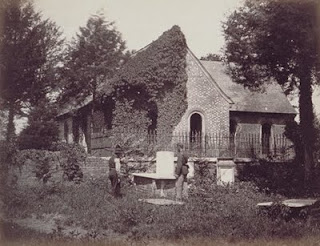Today is the day set aside for Joan of Arc. The Psalm appointed is Psalm 144.
I recall an old abandoned church in Virginia that has been maintained as a memorial to the fallen.
From Eastman House "Gardner's Photographic Sketchbook of the Civil War" 1866 comes this old account;
Interestingly, the church contains what is reportedly the only Tiffany window depiction of a Confederate battle flag.
http://www.craterroad.com/oldblandfordchurch.html
1 Blessed be the Lord, my rock,This past Monday was Memorial Day, and I pause to pray that verses 11 and 12 are heard, Lord hear our prayer. So many young people have given their lives for us over the centuries that we owe it to them to pause and give thanks for their sacrifice. Cut down "like plants full grown", they remain as pillars of our country. Standing among these pillars are also those who tend to get forgotten on Memorial Day, but their graves may often be found alongside the graves of the patriots.
who trains my hands for war, and my fingers for battle;
2 my rock and my fortress,
my stronghold and my deliverer,
my shield, in whom I take refuge,
who subdues the peoples under me.
3 O Lord, what are human beings that you regard them,
or mortals that you think of them?
4 They are like a breath;
their days are like a passing shadow.
5 Bow your heavens, O Lord, and come down;
touch the mountains so that they smoke.
6 Make the lightning flash and scatter them;
send out your arrows and rout them.
7 Stretch out your hand from on high;
set me free and rescue me from the mighty waters,
from the hand of aliens,
8 whose mouths speak lies,
and whose right hands are false.
9 I will sing a new song to you, O God;
upon a ten-stringed harp I will play to you,
10 the one who gives victory to kings,
who rescues his servant David.
11 Rescue me from the cruel sword,
and deliver me from the hand of aliens,
whose mouths speak lies,
and whose right hands are false.
12 May our sons in their youth
be like plants full grown,
our daughters like corner pillars,
cut for the building of a palace.
I recall an old abandoned church in Virginia that has been maintained as a memorial to the fallen.
 |
| Blandford Church, Petersburg |
From Eastman House "Gardner's Photographic Sketchbook of the Civil War" 1866 comes this old account;
"Old Blandford Church," of which a view is here presented, is a great object of interest to all visitors; the cemetery surrounding it having monuments erected one hundred and fifty years ago. The walls of the main body of the building are of English brick, imported from the mother country. The services of the Episcopal Church were first performed in 1735, and continued to be read until 1825, nearly a century. Since that time, owing to the movement of the inhabitants of Blandford to the present site of Petersburg, the church has not been used, although the cemetery, now much enlarged, still continues to be the general depository of the dead. The ivy-covered walls now stand as a historic monument of what was formerly the aristocratic portion of the city. In the cemetery the stranger is not only shown the almost obliterated slab beneath which rests the remains of General Phillips, who died May, 1781, during the war of independence, but also the monument, erected to the memory of the brave volunteers from the "Cockade City," who left houses and friends in the war of 1812. The greater space, however, has been allotted during the last four years to the graves of "Our Soldiers," these words being cut on a simple wooden cross, to mark the resting place of the Confederate dead.Church buildings may live on as memorials to congregations long departed. It is good to see this church put to an honorable use.
A somewhat eccentric sexton, whose father before him performed the same duties, is generally on the spot to enlighten visitors in regard to the history of the church, and is apparently much pleased to do so from the manner in which he enters upon his oft-repeated narrative. During the siege the edifice and its surroundings suffered but little damage from shot or shell, although the position was in front of the point of attack at the time of the explosion of the mine on the 30th July, 1864.
Interestingly, the church contains what is reportedly the only Tiffany window depiction of a Confederate battle flag.
 |
| From Craterroad.com |
Prayer For Joan (traditional language) Holy God, whose power is made perfect in weakness: we honor thy calling of Jeanne d’Arc, who, though young, rose up in valor to bear thy standard for her country, and endured with grace and fortitude both victory and defeat; and we pray that we, like Jeanne, may bear witness to the truth that is in us to friends and enemies alike, and, encouraged by the companionship of thy saints, give ourselves bravely to the struggle for justice in our time; through Christ our Savior, who with thee and the Holy Spirit livest and reignest, one God, now and for ever. Amen.




